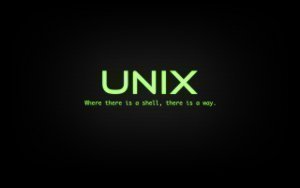UNIX is one of the most important operating systems ever developed. What made Unix stand out in the crowd of countless other operating systems is that it was a competent operating system that was extremely affordable and worked on low cost hardware. Economics definitely played a large part in UNIX’s popularity and today it is still known as a low cost solution to running personal computers, network servers or large commercial servers.
UNIX was originally created in 1969 at AT&T Bell Labs by Ken Thompson, Douglas Ritchie and Douglas Mcllroy. It is currently owned by the Open Group which is an industry standards consortium. There are two types of UNIX, system that are fully compliant and certified to the single Unix specifications are known as UNIX, other types of Unix systems are either called Unix system-like or Unix-like.
In the late 1960’s and early 1970’s most computer operating systems were created from assembly languages which were not text based and extremely complicated. However, Unix was built with the kernel being programming language C. This made Unix portable, easy to use and easy to upgrade, while still using some of the main code. This meant that the code was much cheaper than existing programming languages. Unix was first sent to various universities and later used for government and law enforcement computers. Unix has always had a good reputation regarding security which both government and law enforcement users liked about this program.
During the 1970’s several versions of Unix were developed, especially since many universities that licensed the code from AT&T built upon the code to make it better at running their specific system or to accomplish specific tasks. By 1978 there were over 600 machines using the Unix code.
In the beginning of the 1980’s, AT&T started to create more advanced versions of Unix and therefore started charging much higher licensing fees for these new versions. However, many universities and companies balked at the higher prices instead deciding to continue to develop older Unix versions on their own. One older version that was updated was called BSD (Berkeley Software Distribution or sometimes called BSD-UNIX). BSD was used on a wide variety of commercial main frame and mini-frame computers. It should be noted that although AT&T licensed UNIX, most companies augmented it to fit their needs. By the early 1980’s there were many types of UNIX.
In the early 1980’s, the first personal computers started to become popular and MS DOS still hadn’t become the standard for running PC’s. At this time there was a lot of discussion to come up with a standard Unix so that it could be used on personal computers. However, trying to come up with standardization among many developers did not work out well and in fact were called the Unix wars due to the amount of in-fighting.
It should be noted that Free Unix like systems were first developed in 1983 by Richard Stallman who announced the GNU project. While this project was started in 1983, it was not until 1992 that it was achieved with LINUX which was released under the GNU General Public License. Linux is a mix of the Linux kernel and the GNU Hurd.
In the early 1990’s, AT&T sold the Unix code to Novell. In addition, others had commercial Unix codes such as Unix Digital. In 1995, Novell partially sold some of the rights of Unix code to Santa Cruz Operation. In 2000, Santa Cruz Operations sold the Unix code to Caldera Systems which changed its name to SCO. This company for most part was not interested in developing the Unix code, but sought legal action against Linux manufacturers and distributors for what SCO believed was copyright infringement. While Linux was similar in design to UNIX, it never contained any of the original Unix kernel. In 2007, SCO lost a major court case in which the court stated that Linux was not owned by SCO. Due to this verdict, SCO has no claim regarding Linux and has since filed for bankruptcy.
Another court case involving SCO was SCO vs. Novell. Novell in the 1990’s owned Unix and sold some of the rights to Santa Cruz Operations, which were bought by Caldera Systems. Caldera System renamed themselves SCO and sued Novel for copyright infringement. Novell disputed this claim and stated that they held the Unix source code. Novell stated that they only sold the franchise rights to selling the code and retained core copyrights, veto rights and rights for future licensing activities for SCO. Novell also stated that they own 95% of the licensing revenue. On August 10 2007, the court issued a ruling that stated that Novell, in fact owned the rights to UNIX.
In 2005, Sun Microsystems began releasing its Solaris system code which was based on the earlier BSD Unix language- Unix System V Release 4. This code is now an open source project entitled OpenSolaris. Currently OpenSolaris has produced several new open source projects including SchilliX, Belenix and MarTux.




Seth
This article is has many inaccuracies. It’s DENNIS Ritchie. The Hurd is GNU’s kernel that is not completes yet. Linux IS a kernel only. That’s why it should be called GNU/Linux. Linux is written Linux not ever LINUX.